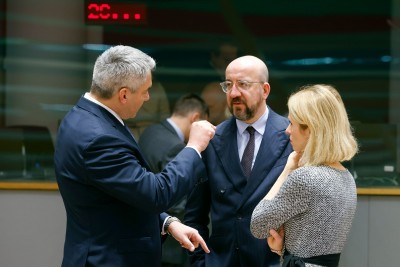Austria in EU Council: Focus on Finance, Migration and Geopolitical Stability – Vindobona.org

The EU member states agreed to reduce the budget by more than 40 billion euros through cuts and reallocations. Particular attention was paid to the increase in funding for the fight against illegal migration by 10 billion euros. Federal Chancellor Nehammer was pleased with the successful reduction of the budget from the original 67 billion euros to around 21 billion euros, taking into account a strong focus on migration and external border protection.
Combating illegal migration and support for Ukraine Nehammer emphasized the need for efficient use of taxpayers’ money, particularly in combating illegal migration and supporting Ukraine. As a net contributor, Austria is committed to an economical and sustainable budget. A special summit in January will clarify further details.
Finally, a further package of sanctions against Russia and a joint commitment to humanitarian aid in the Middle East conflict were discussed.
Anti-Semitism as a central topic
At Austria’s initiative, anti-Semitism was placed on the agenda of the Council meeting. Nehammer emphasized the need to better protect Jewish communities in Europe and to take the growing anti-Semitism seriously.
Austria has positioned itself as a pioneer in the fight against anti-Semitism in Europe. The National Strategy against Antisemitism, which was presented at the beginning of 2021, comprises six strategic pillars, including education, security, and protection of Jewish communities, effective prosecution of antisemitic incidents, measures in the area of integration, better documentation and Europe-wide data comparison, as well as a societal approach to the prevention of antisemitism. By January 2023, 26 of the 38 defined measures had been implemented.
EU enlargement: positive signals for the Western Balkans and Eastern Europe
The Federal Chancellor also spoke out in favor of future accession talks with potential new EU member states. The EU is striving to send positive signals to countries such as the Western Balkans, Ukraine, Moldova, and Georgia to promote their pro-European attitude and support their rapprochement with the EU. The importance of stability in Bosnia-Herzegovina for Europe’s security was particularly emphasized.
Nehammer emphasized the importance of cooperation with the Western Balkans, especially about security and stability. This has repeatedly proved important for Austria, as Vindobona.org reported. The EU sees the strengthening of political, economic, and social relations with this region as a key to securing its security. A bilateral meeting with Serbian Prime Minister Ana Brnabić dealt, among other things, with the harmonization of Serbia’s visa rules with the EU.






